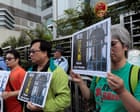
In the ever-evolving landscape of global affairs, recent events in human rights and peace dialogues have drawn significant attention. From the enduring struggles of human rights lawyers in China to proactive international measures in Afghanistan and the pursuit of peace in conflict zones like Gaza, these stories reflect both the challenges and potential paths towards a more harmonious world.
A decade after the largest crackdown on human rights lawyers in China’s modern history, the environment for legal advocacy remains fraught with challenges. In 2015, a government’s campaign resulted in the arrest of hundreds of rights advocates, creating an atmosphere where practicing law with a focus on human rights has become increasingly difficult. According to Ren Quanniu, a disbarred human rights lawyer, the current climate regarding the rule of law in China bears unsettling similarities to the Cultural Revolution era, a period marked by significant disruptions to legal and judicial norms. This landscape highlights the intricate balance between governance and civil liberties that continues to evolve.
In Gaza, the journey toward peace is progressing slowly yet deliberately. Despite hopes of expedited ceasefire agreements, officials in Qatar indicate that more discussions are needed. The recent talks, initiated with a broad US-sponsored outline, aim to establish a 60-day ceasefire that could eventually lead to a more permanent resolution to the ongoing conflict. The discussions remain ongoing, reflecting the complex nature of achieving lasting peace in the region. Amid these diplomatic efforts, the situation on the ground remains difficult as Gaza’s health system grapples with the consequences of recent hostilities, highlighting the urgent need for effective conflict resolution and humanitarian support.
The international community has also taken notable steps in addressing human rights violations. The International Criminal Court (ICC) recently issued arrest warrants for senior Taliban leaders, specifically targeting actions against women and girls. Accused of implementing policies that severely restricted women’s rights in Afghanistan, the Taliban’s supreme leader, Haibatullah Akhundzada, and chief justice, Abdul Hakim Haqqani, are charged with crimes against humanity. This decision by the ICC has been met with approval from rights activists, marking a formidable legal stance against the continued suppression of women in regions under Taliban control.
As these stories unfold, they serve as a reminder of the ongoing global efforts to uphold human rights, promote peace, and ensure justice. Though the journey is fraught with obstacles, these developments reflect a collective striving towards a future where dialogue and legal accountability pave the way for enduring peace and dignity for all. In this interconnected world, the spotlight will remain on these crucial efforts, fostering hope for equitable resolutions and progress.
Source: {link}
